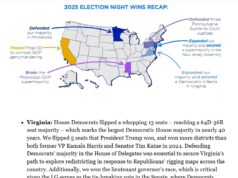| Arlington, VA — The Arlington County Board voted 4-0 today to continue using ranked choice voting (RCV) in its 2025 County Board general election, though concerns about voter education funding led one member to abstain. The vote extends Arlington’s leadership as the first Virginia county to use ranked choice, building on pilots during its 2023 and 2024 elections.
“Over the last two years, we’ve seen RCV improve both the process and outcomes of our local elections,” said Meredith Sumpter, an Arlington resident and CEO of FairVote, who testified in support of the measure. “Campaigns have become more positive, as candidates work to build deeper coalitions of voter support,” she said. “And campaigns have become more substantive, as candidates focus on local problems, like housing, that need to be solved and deserve nuanced debate.”
In a ranked choice election, voters can rank their preferred candidates from most to least favorite. The ballots are then tallied in an instant runoff that identifies the winner(s) with most support. When a candidate is eliminated from the race, their supporters’ votes transfer to their next preferred candidate. The RCV process encourages candidates to build support from a broader range of residents by appealing to voters who might not rank them first.
Results from Arlington’s ranked choice elections show the system is largely working as intended. All three of the County’s recent RCV races have featured at least four candidates, and “the County Board has grown more diverse in age, gender, race, and life experience” noted Sumpter. Arlington’s three RCV winners to date include both of the Board’s female members, Maureen Coffey and Susan Cunningham, and its lone Black member, JD Spain.
The vote to extend RCV use was not without debate. Spain, the Board’s newest member, shared deep concerns with the County’s voter education efforts and urged greater financial investment in community outreach. “Some states have put a lot of money into ranked choice voting for implementation. Some communities have as well,” he said. “We have not heard — I have not heard — what are we going to do moving forward to engage the community. I heard we need to — we must — but it’s going to cost money.”
County Manager Mark Schwartz suggested the Board could make time for a more detailed discussion on the cost of community outreach during its upcoming budget season, which stretches over the coming six weeks. In response, Spain proposed the Board delay a formal vote on the RCV ordinance until its March meeting so that funding for voter education could be allocated first.
Other Board members expressed reservations about delaying a decision into March, noting that candidates need certainty about the election method before the April 3 filing deadline for the June primary. The Board’s Vice-Chair Matt de Ferranti committed to working with Spain on funding voter education during the budget process but did not wish to delay a vote on the ordinance. “I think I’m nearly in the same place [as Spain],” said de Ferranti. “I just want us to move forward and vote on this issue so candidates have a little clarity.”
The Vice-Chair’s sentiment carried the day, and the Board approved the ordinance extending RCV through the 2025 general election on a 4-0 vote, with Spain abstaining due to his budget concerns.
“I do like ranked choice voting, but I’ve also often said there’s a wrong way to do the right thing,” said Spain. “I need to know where the money’s coming from and how we’re going to be intentional as a Board and as a government to get into some of these communities so they know more about ranked choice voting.” Spain also urged the Board to integrate its RCV discussion with the County’s broader debates about reforming its County Manager form of government.
Board member Susan Cunningham supported the ordinance but echoed Spain’s desire for deeper voter education. “It’s absolutely critical that we do turn on the education jets so we get as quickly as possible to the best level of education as we can.”
Cunningham was also encouraged by reporting from the County Registrar on her staff’s experience working with voters during last fall’s election. “I would say 1 in 100 [voters] would stop and ask us for more of an explanation with ranked choice voting,” said Registrar Gretchen Reinemeyer. “Those who did need extra assistance with ranked choice voting needed assistance with the whole ballot. It was not just confusion limited to the office using ranked choice voting.”
As Arlington works to strengthen its voter education efforts, the ranked choice reform movement continues to gain momentum across Virginia and the region. Charlottesville has adopted ranked choice for its City Council primary this June, and several other Virginia localities are exploring adoption, including Newport News and Loudoun County. Last fall, DC voters approved a ballot measure to adopt RCV in their elections by an overwhelming 70% margin.
A recording of the Board’s discussion can be viewed here. |













